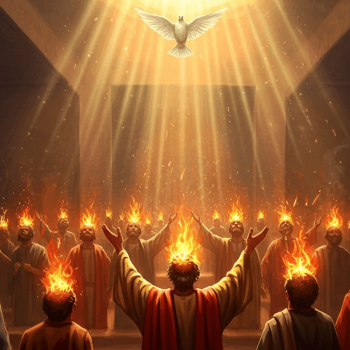What’s So Holy About the Trinity? – Trinity Sunday – June 15, 2025
Proverbs 8:1-4, 22-31; Psalm 8; Romans 5:1-5; John 16:12-15
Celebrating the glories of God’s presence in the world continue on Trinity Sunday. Although the Trinity is much neglected in progressive churches, its theological resurrection is essential for a holistic theological, spiritual, and political vision in our time.
Following the radical amazement inspired by Pentecost Sunday, we move from the Descent of the Spirit, and the transformation of the Jesus Movement, to the celebration of God in all God’s wondrous diversity and presence. God is the transformative one and many, that gives life, inspires, and saves all creation. The Trinity is both paradoxical and profound, cosmic and intimate, transcendent and historical. (For on Pentecost, see “A New Pentecost for Progressive Christians,” Energion Publications, 2025)
Our Trinitarian reflections begin with the affirmation that God is one: Christianity is a monotheistic religion. In fact, most progressive Christians and process and open and relational theologians focus on the wholeness of God and minimize the Spirit and often also Jesus as the Christ as separate persons. Affirming the fullness and unity of God, do we really need to talk about diversity in divinity? How can reflecting on the Trinity deepen our faith, especially in the context of postmodernism and its focus on experience, rather than doctrine? In what way, will Trinitarian conversation enrich Christian experience and social commitment? These are all good questions, and the answers are not necessarily easy to find?
The readings from Psalm 8 and Proverbs 8 complement each other, and both have a place in worship and preaching. Psalm 8 proclaims the grandeur of God. We live in a majestic universe, whose immensity dwarfs the pretenses of humankind. God is God and we aren’t. God is God and Putin is not, Trump is not, Xi is not. God’s creative wisdom is revealed in all things, in galaxies without number and the intricacy of the human body.
Still, as infinitesimal as we are in the scheme of things, we have a God-inspired vocation. The Infinite needs the finite to complete God’s creative and restorative work on earth as it is in heaven. Immanent in all things, God still has a unique vocation for humankind: to mirror divine creativity and beauty in our own lives and stewardship of the earth, to be God’s presence in nurturing the Good Earth. Our “dominion” is vocational and not a matter of hierarchy. We are to be gardeners of creation, partnering with God in healing the earth. Our uniqueness as God’s representatives is intended for mission and healing, not domination and destruction. We are a part of creation, not apart from creation, and our divinity is in the full humanity that heals the earth.
Proverbs 8 speaks of Sophia, Divine Wisdom, as God’s creative companion. God is not just male or female. Divine creativity embraces the whole of creaturely experience. God is he/she/they and more. Perhaps the predecessor to the Prologue of John’s Gospel – and its vision of God’s Creative Word/Logos – Proverbs 8 affirms the feminine creativity of God. From the heart of divinity, she creates alongside the Parent/Creator, bringing order to the universe and delight to the creator. She is almost like a child, creating refrigerator art and spinning tales for the Godhead, and perhaps the world in its complexity can be seen as divine offspring, participating in the Divine DNA, revealing divine wisdom at every juncture. Yet she is a wise child, bringing beauty, novelty, diversity, and order to this wondrous universe.
The global Spirit who inspires a democracy of revelation is also intensely personal in nature, addressing all of us and also each of us uniquely. The Infinite is the Intimate. In the spirit of Psalm 8 and Proverbs 8, the reading from Romans 5 describes the immanence of God as Spirit. God has poured God’s Spirit in our hearts, giving us courage, patience, and fortitude. Everywhere God acts – in all of God’s revealing – there is a moral element. God aims at beauty and creative and orderly innovation in the creation of the cosmos; God also aims at character and creativity in the human adventure. God’s Spirit is our deepest reality, flowing into our hearts and throughout our whole being, body, mind, spirit, and relationship. The body is inspired and the spirit embodied through the creative wisdom of God’s Spirit. (For more on the Holy Spirit, see Bruce Epperly, “Restless Spirit: The Holy Spirit from a Process Perspective.”)
John’s Gospel speaks of Jesus’ message continuing through the work of the Holy Spirit. The Holy Spirit is the Spirit of Jesus, reflecting his message and values. The Holy Spirit’s gifts are not found primarily in speaking in tongues and Pentecostal drama but in living in the way of Jesus, welcoming, embracing, healing, and nurturing. Spirit-centered living is, first of all, ethical and unifying. God’s Spirit reveals Jesus’ mission with honesty and integrity. Intentional dishonesty, whether seen in conspiracy theories, lies about the big beautiful budget, distortions of the impact of budget cuts, or false attacks on immigrants undermines the work of the Spirit, and can be described as blasphemy. Living Jesus’ Spirit joins us with all creation, building bridges with diversity, inspiring us to creativity, and mediating divine healing. The Spirit calls us, in all our fallibility, to seek to open channels of grace and inspiration. The Spirit calls us to be Christ’s embodiment in a world of division and violence.
If we are to focus on the Trinity – and it seems appropriate on Trinity Sunday! – our focus should be spiritual and ethical and grounded in solid theological reflection. Western Christians might do well to embrace elements of Eastern Christian theosis, or divinization. God’s grace is as much, if not more, about sanctification and holiness, becoming like unto divinity as possible, as forgiveness. Atonement is not an external reality, divine acceptance of the sinner in her or his otherness, as at-one-ment, unity with God in purpose and vision.
On Trinity Sunday, we are to claim our god-like vocation. Limited and fallible, we are yet God’s companions in healing the earth and this healing takes place one intentional and loving act at a time.
Trinitarian thinking proclaims a divine bias toward innovation, balancing order, justice-making, hospitality and unity, and healing. To embody God’s Trinity is to imitate Jesus – and Jesus’ own reflection of divine healing-creativity – in our daily lives and political and economic commitments. Moreover, the Trinity is the ground and inspiration to the quest for healthy diversity, equity, and inclusion in the social order. The Trinity is God’s DEI in Godself and in the world.
Far from abstract, Trinitarian thinking is incarnate in the hardscrabble world of balancing security with hospitality, budgeting with social safety nets, unity with diversity, and national sovereignty with welcoming the stranger. The answers may not come easily, whether in our lives as individuals, congregants and pastors, and citizens, but the bias must always be toward unity, healing, and affirmation in the intersection of theology, spirituality, and politics.
+++
The author of the recently released, “A New Pentecost for Progressive Christians (A New Pentecost for Progressive Christians: Epperly, Bruce G: 9781631999413: Amazon.com: Books) Bruce Epperly is Theologian in Residence at Westmoreland Congregational United Church of Christ, Bethesda, MD (https://www.westmorelanducc.org/) and a professor in theology and spirituality at Wesley Theological Seminary. He is the author of over 80 books including: “Homegrown Mystics: Restoring the Soul of Our Nation through the Healing Wisdom of America’s Mystics” (Amazon.com: Homegrown Mystics: Restoring Our Nation with the Healing Wisdom of America’s Visionaries: 9781625249142: Epperly, Bruce: Books) “Jesus: Mystic, Healer, and Prophet “(Jesus: Mystic, Healer, and Prophet: Epperly, Bruce: 9781625248732: Amazon.com: Books), Saving Progressive Christianity to Save the Planet”( Saving Progressive Christianity to Save the Planet: Epperly, Bruce G: 9781631999215: Amazon.com: Books), and his most recent book, “God of the Growing Edge: Whitehead and Thurman on Theology, Spirituality and Social Change.” (The God of the Growing Edge: Whitehead and Thurman on Theology, Spirituality, and Social Change: Epperly, Bruce G: 9781631999291: Amazon.com: Books The God of the Growing Edge: Whitehead and Thurman on Theology, Spirituality, and Social Change: Epperly, Bruce G: 9781631999291: Amazon.com: Books)














